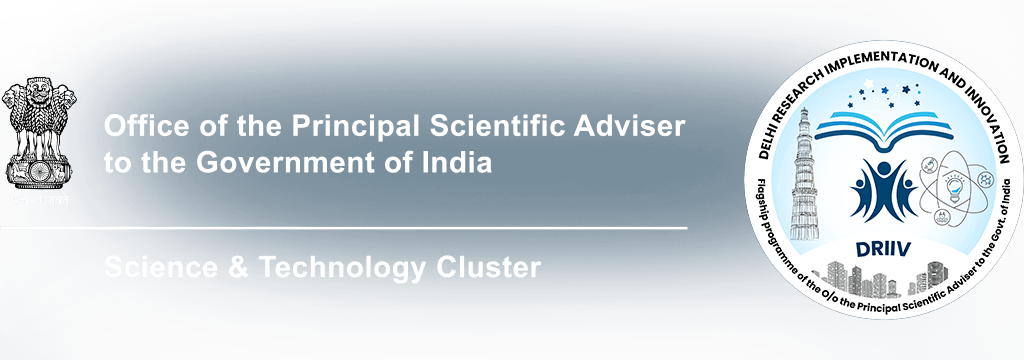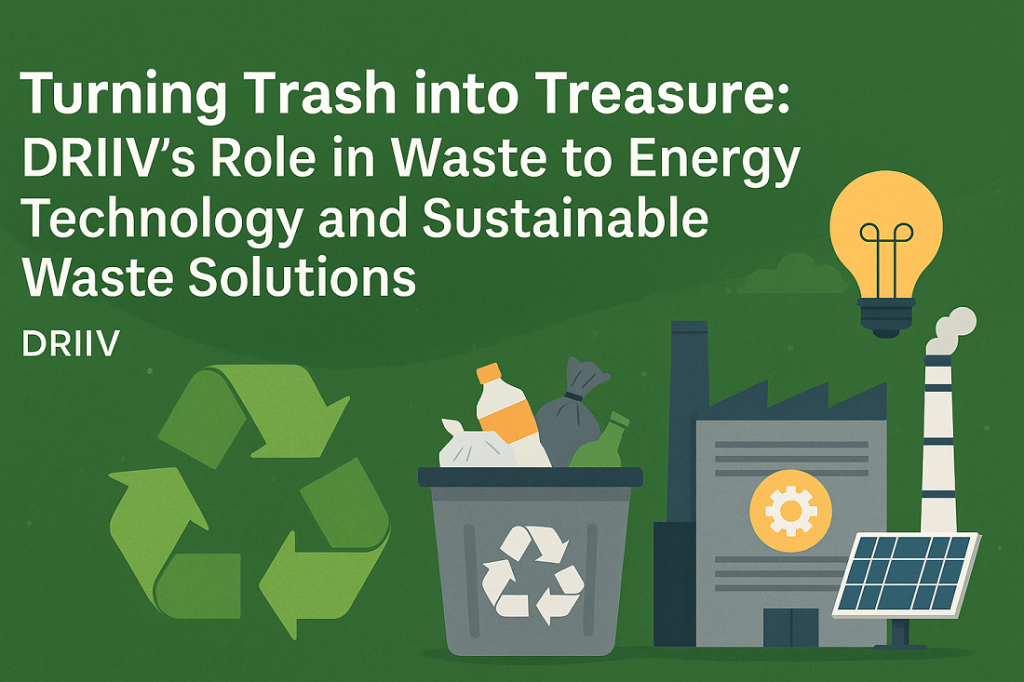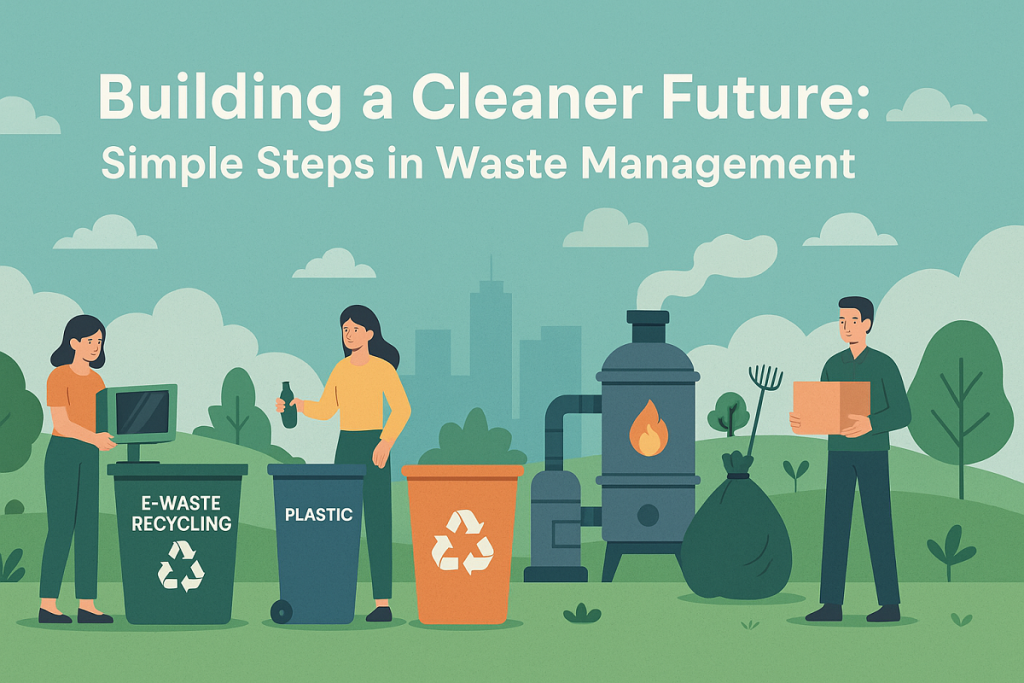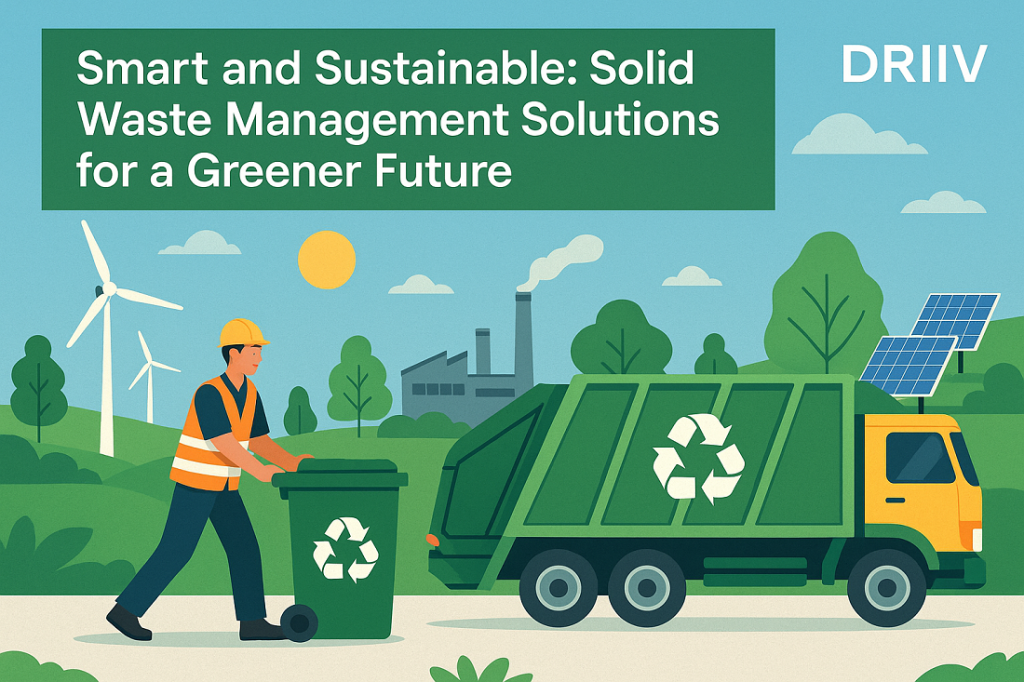In today’s world, waste is a growing problem. With millions of tons of garbage generated every day, finding smart and sustainable ways to handle waste has become urgent. The good news is that waste is no longer just a problem—it’s an opportunity. Using modern technologies and smart practices, waste can be turned into valuable energy and resources.
At DRIIV, we believe in turning waste into a valuable resource through innovation. We focus on waste to energy technology, Waste Segregation, E-Waste Recycling, and Plastic Waste Management to build a cleaner and greener future.
Why Waste Management Is Important
India generates over 150,000 tonnes of waste every day. Without proper waste management, this leads to pollution, health hazards, and damage to our environment. Waste management is not just about throwing garbage in dustbins. It is about collecting, segregating, recycling, and recovering energy from waste.
Let’s understand the major ways DRIIV is contributing to India’s waste management revolution.
1. Waste to Energy Technology: Power from Trash
Waste to energy technology refers to the process of turning waste materials into usable energy—like electricity, heat, or fuel.
How It Works:
- Organic waste (like food scraps, paper, or garden waste) is collected.
- This waste is burned, fermented, or processed using special machines.
- The result is clean energy that can be used to power homes, factories, or even vehicles.
Benefits:
- Reduces the amount of waste going to landfills.
- Creates renewable energy.
- Reduces greenhouse gases like methane and carbon dioxide.
- Saves space in cities and towns.
DRIIV’s Role:
At DRIIV, we work with startups and research teams to promote waste to energy technology in both rural and urban areas. We help in deploying biogas plants, pyrolysis units, and waste-to-fuel conversion units that turn waste into electricity and biofuels.
2. Waste Segregation: The First Step to a Cleaner Planet
Waste Segregation means separating waste into different categories at the source itself. This makes recycling and energy recovery much easier and more effective.
Types of Waste:
- Wet Waste: food leftovers, vegetable peels, garden waste.
- Dry Waste: plastics, paper, glass, and metals.
- Hazardous Waste: batteries, e-waste, paint cans, chemicals.
Why Segregation Matters:
- Helps in better recycling.
- Reduces pollution and disease spread.
- Lowers landfill pressure.
- Makes waste processing easier and cheaper.
DRIIV’s Action:
DRIIV runs awareness campaigns, installs smart bins, and collaborates with municipal bodies to improve Waste Segregation practices in homes, schools, and public spaces. Our goal is to ensure that every household in India becomes waste-conscious.
3. E-Waste Recycling: Giving Gadgets a Second Life
E-Waste Recycling is the process of safely handling and reusing old electronics like mobiles, laptops, batteries, and TVs.
Why E-Waste Is Dangerous:
- Contains toxic metals like mercury, lead, and cadmium.
- Causes soil and water pollution if not handled properly.
- Harmful to workers and animals.
How E-Waste Is Recycled:
- Devices are collected and dismantled.
- Useful materials like copper, gold, plastic, and glass are separated.
- Hazardous parts are treated or disposed of safely.
DRIIV’s Contribution:
At DRIIV, we support E-Waste Recycling startups, promote safe e-waste collection methods, and educate people about the dangers of electronic waste. We also help build eco-friendly recycling plants across cities.
4. Plastic Waste Management: Solving the Plastic Crisis
Plastic Waste Management is about reducing, reusing, and recycling plastic products.
The Plastic Problem:
- Plastics take hundreds of years to decompose.
- Harm marine life and clog water bodies.
- Release harmful microplastics into the environment.
- Effective Management Strategies:
- Use alternatives like cloth bags and paper packaging.
- Set up plastic collection centers.
- Recycle plastics into products like tiles, road materials, and fabrics.
DRIIV’s Role:
We are actively involved in Plastic Waste Management by collaborating with innovators who turn plastic waste into usable products. DRIIV also supports decentralized solutions like mini plastic recycling units in remote areas.
Real-Life Impact: DRIIV in Action
- Here are a few examples of how DRIIV is making a difference:
- Community Composting Projects in Delhi that convert food waste into natural fertilizer.
- Smart E-Waste Collection Drives with schools and colleges to gather old devices for safe recycling.
- Plasma Pyrolysis Units to manage hazardous biomedical waste.
- Plastic-to-Fuel Plants that help rural entrepreneurs generate income and reduce pollution.
Why DRIIV’s Work Matters
At DRIIV, our vision is to create a sustainable and self-reliant India by using science and technology. Waste management is one of our key focus areas. With our network of researchers, innovators, startups, and government partners, we aim to bring real solutions that impact everyday lives.
What You Can Do to Help
Even small changes in daily habits can support the larger goal:
- Always segregate your waste at home.
- Recycle old phones and electronics at certified centers.
- Say no to single-use plastics.
- Support local recycling and composting projects.
- Learn and spread awareness in your community.
Together, we can turn waste into wealth!
FAQs
1. What is waste to energy technology?
Waste to energy technology is a method that converts garbage into usable energy like electricity or fuel, reducing landfill waste and producing clean power.
2. Why is Waste Segregation important?
Waste Segregation helps in better recycling, lowers pollution, and makes waste easier to process. It’s the first step in proper waste management.
3. How is e-waste recycled?
E-Waste Recycling involves collecting old electronics, breaking them down, and safely recovering useful materials like metals and plastics.
4. What are some plastic waste management methods?
Plastic Waste Management includes reducing plastic use, reusing plastic items, and recycling plastics into useful materials like tiles, road materials, or clothing.
5. How is DRIIV contributing to waste management in India?
DRIIV supports innovative solutions like waste-to-energy plants, plastic-to-fuel technologies, e-waste recycling centers, and smart segregation systems to promote sustainable waste handling across India.
Conclusion
Managing waste is not just the government’s job—it’s everyone’s responsibility. With the right mix of technology, awareness, and collaboration, we can reduce pollution and build a better future. At DRIIV, we are committed to providing solutions in waste to energy technology, Waste Segregation, E-Waste Recycling, and Plastic Waste Management.
Let’s work together to make India clean, green, and self-reliant—one step at a time.




